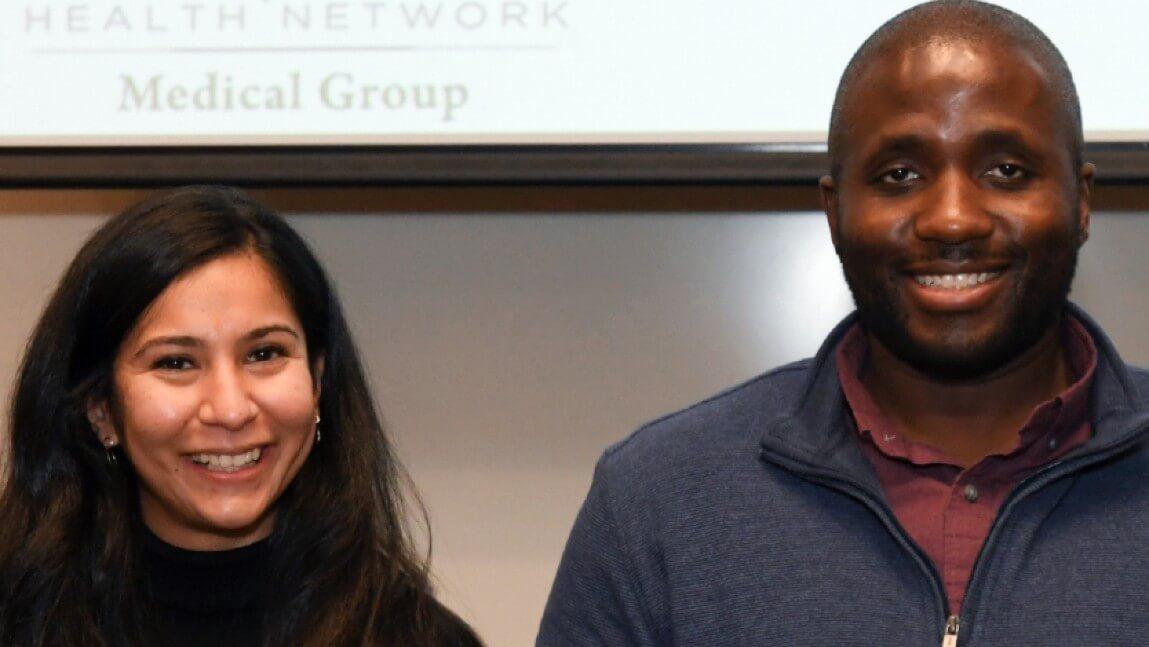Miller Celestin began his nursing career in a New York City hospital, working on the floor with colleagues from around the world. His coworkers immigrated to the U.S. from Africa, the Caribbean, and the Philippines. But things looked vastly different when he took a job in a Chicago hospital.
“I had no idea that nursing was a predominantly white field until I left New York City,” said Celestin. He also noticed something else in the new hospital setting: “A lot of the nurses were white, and a lot of nurses’ aides were Black, Hispanic, or recent immigrants.” Many confided that they saw no potential for career advancement because they did not see anyone like them in other roles.
More than a decade into his career, working in the emergency department at UVM Medical Center and teaching nursing at the University of Vermont, Celestin understands how formative those first years were to his future.
“I realized how impactful it was for me to have had that experience in New York City first,” he said. “Because it affirmed my sense of belonging and confidence as a nurse.”
Celestin believes there are two significant barriers between an individual and success: time and money. But he acknowledges another perceived barrier: “The idea that ‘I can't do this because I don't see a way.’”
The solution to that, he says, is mentorship. The confidence Celestin gained from his early nursing experiences morphed into guidance, motivation, and coaching for his colleagues as he helped them begin to see a path toward their goals.
In his current role at the University of Vermont, in a state where 94% of the population is white according to U.S. Census data and UVM Diversity - Enrollment Trends show 13.6% of students in UVM's College of Nursing and Health Sciences are students of color, Celestin recognized that mentorship could be a valuable asset for the BIPOC (Black, Indigenous, People of Color) academic community.
Building a sense of belonging
Celestin connected with Anisha Rimal, a pediatrician and assistant professor at the Larner College of Medicine, who had also been considering ways to support BIPOC students. Rimal and Celestin created Finding Affinity and Mentorship (FAM), a pilot program in which physician faculty, nurse practitioners, advanced practice nurses, graduate nursing students and medical residents mentor third- and fourth-year nursing students and first-year medical students. The mentorship clusters offer opportunities for repeated interaction and relationship building.
“Students of color have spoken of the feeling that they cannot quite connect with their peers for various reasons, such as not coming from the same city, the same background or socioeconomic status, or because of a different perception of what constitutes being a good student,” said Celestin. “A sense of belonging begins with the development of relationships.”
Another aspect of belonging is understanding the accessibility of resources available to the community, said Celestin. “One thing I have noticed about many students of color is that they come to college and think, ‘I’ve just got to tough it out.’”
Whether it is because they come from different backgrounds or schools where seeking help was not part of their experience, Celestin intends to change this perspective on seeking and accepting support. “I am hoping as a mentor to say 'Here are the resources: You take advantage of them. They are here for you.'”
Meaningful mentorship
As a woman of color who trained in a predominantly white institution, Dr. Anisha Rimal said her mentors helped her feel "seen, supported, and safe while working in stressful and challenging environments.” The experience fuels her drive to promote these critical aspects of support in her work with BIPOC health professions students.
"I understand first-hand how impactful strong mentorship can be for health professions students, having benefited from incredible mentors during my medical training," said Rimal. “Having affinity spaces was hugely helpful for my overall mental health and well-being."
Capacity for connection
Celestin also wants the program to emphasize the value that diverse individual perspectives can bring to healthcare practice and the capacity to understand and connect with patients.
“Many of the nurses that I worked with in Chicago, in my experience - not just because of their race, but because of maybe their socioeconomic backgrounds, education, their experiences - couldn't quite connect with certain patients who probably couldn't easily go pick up their medications or go home with a Foley catheter,” said Celestin, recalling a day when another nurse reminded him he never had to decide between a toothbrush and toothpaste. “I hope to allow all students to realize that their experience adds value.”
Ultimately, FAM aims to provide broad and deep support for BIPOC students to reach their goals at UVM.
“We hope the program will create an interprofessional community of BIPOC health professions students, faculty, and staff that improves the sense of belonging of mentors and mentees, enhances the mentors' mentorship skills, and fosters a sense of community and connection,” said Rimal.
“They may not see a path forward, and I want to give that to them,” said Celestin.
Anisha Rimal, M.D., assistant professor of pediatrics, and Miller Celestin, M.S.N., RN, clinical instructor of nursing, were awarded a $50,000 University of Vermont Health Network Medical Group Educational Scholarship Award to support their program titled Finding Affinity and Mentorship (FAM). FAM uses a “cluster mentoring” model to increase avenues of support for BIPOC (Black, Indigenous, People of Color) healthcare students, decreases the “minority tax” on BIPOC faculty serving as mentors, and creates an interprofessional framework that has the potential to strengthen a network of support for the entire BIPOC health care community. The Larner Office of Diversity, Equity, and Inclusion and the College of Nursing and Health Sciences also support the initiative.
